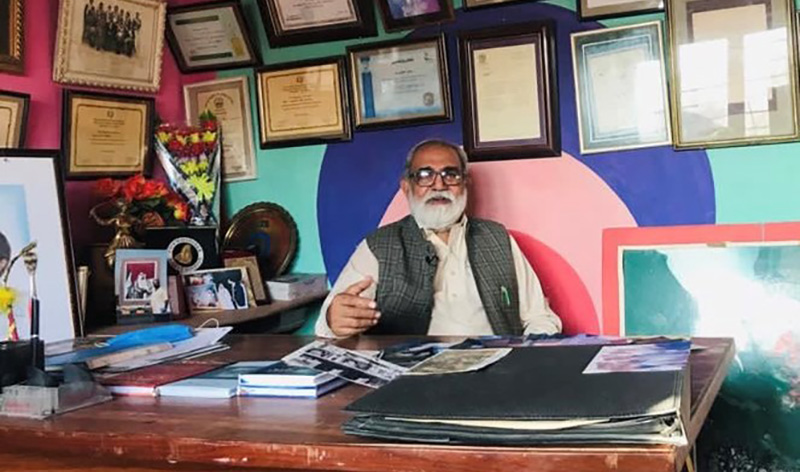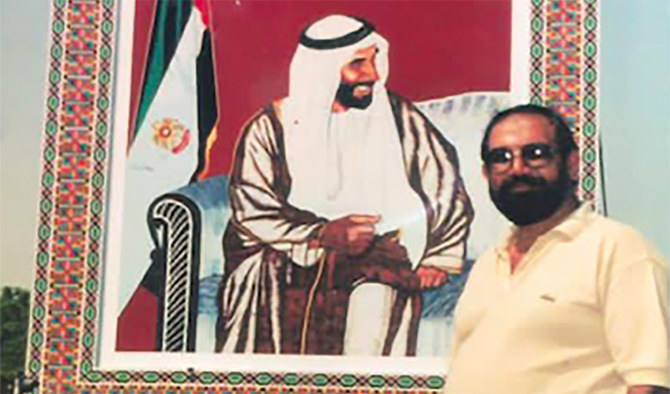KOHAT: Four decades ago, a man traveled from Kohat in northwestern Pakistan to the United Arab Emirates in search of a better life. He was part of a group of daily wage laborers, all of them from poor families and looking for better prospects.
But one thing set Liaquat Ali Khan apart: his passion for art, which would go on to change the course of his life.
“I went to watch a Pashto film in Abu Dhabi,” Khan, now 70, told Arab News at his office in Kohat, recalling his time in the UAE in the early eighties. “On stepping out of the cinema, I saw a man who was struggling to paint a billboard. I walked up to him and volunteered to help.”
As Khan painted, another man, a bank executive, observed him for a while and then walked up to him and struck a conversation. The man wanted to know if the painter could draw portraits. He said yes. A few days later, the banker took Khan to see his boss, who commissioned a portrait of UAE’s founding father and then ruler, Sheikh Zayed bin Sultan Al Nahyan, to be unveiled on UAE’s national day.

Liaquat Ali Khan, a Pakistani artist, speaks to Arab News at his office in Kohat, Pakistan, on Dec. 1, 2020. (AN photo)
That moment marked a new beginning for Khan, who had a degree in fine arts from the University of Peshawar but never thought he could have a career as an artist. But his first portrait landed him a job with the Abu Dhabi Municipality where he went on to work for 29 years.
“I adorned my canvas with UAE royals and painted over a thousand portraits,” said Khan whose work has been displayed in public parks and along major thoroughfares in Abu Dhabi ahead of the UAE national day, celebrated each year on December 2.
Emirati officials also bestowed on him the title of “golden hand” as his reputation as an artist spread.

Liaquat Ali Khan, a Pakistani artist, writes an Urdu inscription at his office in Kohat, Pakistan on December 1, 2020. (AN Photo)
“Over a period of time, officials and locals began to recognize me through my work and started calling me the golden hand,“Khan said. “But it was a huge portrait of Sheikh Zayed that captured the attention of the royal family.”
In 1999, he was invited to meet the UAE ruler himself.
“He was clearly interested in the world of art and knew a lot about it,” Khan said.
Ten years after his meeting with Al Nahyan, Khan returned to Pakistan — not an ‘easy decision,’ he said — where he began teaching art at Kohat University. He also set up an art academy in his native town, where 17 students, both boys and girls, are currently studying.

Students of Liaquat Ali Khan, a Pakistani artist, seen practicing calligraphy at his art academy in Kohat, Pakistan, on December 1, 2020. (AN Photo)
“Creativity and art have brought me closer to nature and I am focused more on them than ever before,” said Omar Shahid, a second-year medical student who took up drawing as a hobby and joined the academy about a year ago.
Today, Khan says he is proud of his journey. The walls of his office in the art academy are decorated with photographs and shields. Some of the photos capture his interactions with high-profile Pakistani personalities such as former military ruler General Pervez Musharraf and ex-prime minister Benazir Bhutto.
The artist said he had also completed a 500-piece portrait of Pakistan’s founding father, Muhammad Ali Jinnah, and requested Musharraf to display it at Jinnah’s mausoleum. He smiled as he said he had no idea where that work had disappeared.
“He [Musharraf] agreed and instructed officials [to display the Jinnah portrait at his tomb],” Khan said. “But the painting has disappeared. It’s probably gathering dust in some government storage facility.”

















